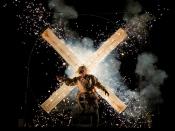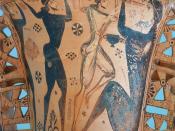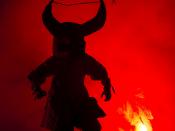Values of The Odyssey You've been gone from your family and friends for 20 years. Do you have the drive to continue? To have the chance to see your wife and son after so long, can you go on? In one of the most famous epics of all, Odysseus continues his journey home, to be reunited with his wife and son again. The Odyssey delineates the tasks to be overcome by Odysseus and his men. Throughout this adventure, there are many risks to be taken and values that are derived from Ancient Greece.
The first value portrayed in this epic is that of courage. In Odysseus, courage is impulsive and it is shown in many ways. Distinctly, an example of courage is when Odysseus encountered the Cyclops. Anyone caught in a cave of a prodigious, unsightly, man-eating creature, with one immense protruding eye, would become squeamish under fear. On the other hand, Odysseus saw this as a challenge to be overcome by tricking the huge creature, Polyphemus. "My heart beat high now at the chance of action,/ and drawing the sharp sword from my hip I went/ along his flank to stab him where the midriff/ holds the liver..."(L.
244- 247) Only the most fearless man would have such courage to attempt facing a giant like Polyphemus alone.
The next values shown are self control and quick thinking. These values are represented also by the confrontation of the Cyclops. Self control was represented by Odysseus once again by him being able to maintain a calm while seeing his men getting swept up for a cannibalistic feast by Polyphemus.
"...in one stride he clutched at my companions/ and caught two in his hands like squirming puppies/ to beat their brains out, spattering on the floor./ Then he dismembered them and and made his meal..." (L. 233- 236) Odysseus was able to remain calm and still be able to decide not to kill him then, like a man usually would, but to wait till morning for he and his men it would be impossible to move the large boulder blocking the exit. In addition, an instance of quick thinking that was very beneficial was when Odysseus first introduced himself to Polyphemus, as Nohbdy. "Cyclops,/ you ask my honorable name? Remember/ the gift you promised me, and I shall tell you./ My name is Nohbdy: mother, father, and friends,/ everyone calls me Nohbdy."(L.312- 316) This helped him and his men when they drove the 6 foot spike into his only eye, Polyphemus cried out for help, and the other Cyclopes thought otherwise. "Nohbdy, Nohbdy's tricked me, Nohbdy's ruined me!" This quick thinking on behalf of Odysseus was used as a perfect deception. Furthermore, and example of self control is when Odysseus returns home after 20 years and see's his wife and son, but is able to maintain his composure to assure himself that Penelope had been true to him. "O my dear lady.../... Do not enforce me to recall my pain./ My heart is sore; but I must not be found/ sitting in tears here, in anothers house:/ It is not forever to be grieving."(L.1298- 1303) In this passage Odysseus has disguised himself with Athenas help, as an old beggar man that has come to Penelope's home, truthfully to find if Penelope has been true to him and to kill the suitors in his house. No one knows of him but his son, Telemachus, who in the end helps him kill off the suitors. After 20 years of not seeing your wife or son, you must have a substantial amount of self control to carry on a conversation with your wife, with her having no idea who you really are. The last instance of quick thinking was displayed by Penelope. She developed a test in which only Odysseus would know how to react to. She said: "Strange man,/ if man you are... this is no pride on my part/ nor scorn for you- not even wonder, merely,/ I know so well how you- how he- appeared/ boarding the ship for Troy. But all the same.../ Make up his bed for him, Eurycleia./ Place it outside the bedchamber my lord/ built with is own hands.
Pile the big bed/ with fleeces, rugs, and sheets of purest linen."(L. 1562-1569) Odysseus snapped, raging "Woman, by heaven you've stung me now!/ Who dared to move my bed?/ No builder had the skill for that- unless/ a god came down to turn the trick. No mortal/ in his best days could budge it with a crowbar./ There is our pact and pledge, out secret sign,/ built into that bed- my handiwork/ and no one else's!"(L.1572-1578) Odysseus passed her test and they were then reunited again after 20 years.
Another value Odysseus presents is leadership. Leadership qualities are well respected in all civilizations. Being a leader was natural to Odysseus, he lead his men in and out of many tough decisions only a true leader could make. While in the cave of the Polyphemus, Odysseus came up with the idea of blinding the immense creature to get free from wrath of the Cyclopes. He was willing to risk his life to save his men, for he was one of the five that drove the wooden stake into Polyphemus' large eye. "Now came the time to toss for it: who ventured/ along with me?/ whose hand could bear to thrust/ and grind that spike in Cyclops' eye, when mild/ sleep had mastered him? As luck would have it,/ the men I would have chosen won the toss-/ four strong men, and I made five as captain."(L.279- 284) This is a fine example of Odysseus leading his men into a triumph. Another example of leadership is in the Land of the Dead. In order to find his way back to Ithaca from Aeaea, the island ruled by Circe, he confers with Circe. She informs him that to return home to Ithaca, he must travel to the Land of the Dead, to consult Tiresias for his way home. Alone, he went through Erebus and Hades, searching for Tiresias. While in the Land of the Dead, Odysseus had to sacrifice his best lamb, before she calved, for the dead. While keeping his mind fixated on the reason for descending there, he was able to get past the sight of his dead mother and remain a leader for his men to return safely home. "Seeing this ghost I grieved,/ but held her off, through pang on pang of tears,/ till I should know the presence of Tiresias." (L.617-619) Leadership was a very important quality and was shown meticulously through Odysseus.
Many values of Ancient Greece were depicted in this epic, perhaps, the most famous of all. These were a few representations of them. Odysseus was a strong-willed man, with exceptional leadership qualities, and a iron heart. These values he had, kept him on track and ready for anything and in the end proved himself wisely.





